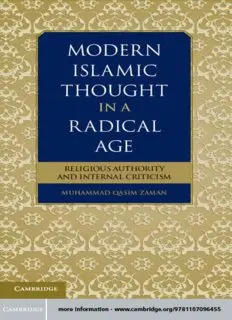
Modern Islamic Thought in a Radical Age: Religious Authority and Internal Criticism PDF
Preview Modern Islamic Thought in a Radical Age: Religious Authority and Internal Criticism
modernislamicthoughtinaradicalage Among traditionally educated scholars in the Islamic world there is much disagree- ment on the crises that afflict modern Muslim societies and how best to deal with them,andthedebateshavegrownmoreurgentsince9/11.Throughananalysisofthe workofMuhammadRashidRidaandYusufal-QaradawiintheArabMiddleEastand anumberofscholarsbelongingtotheDeobandiorientationincolonialandcontem- porarySouthAsia,thisbookexaminessomeofthemostimportantissuesfacingthe Muslimworldsincethelatenineteenthcentury.Theseincludethechallengestothe binding claims of a long-established scholarly consensus, evolving conceptions of thecommongood,anddiscoursesonreligiouseducation,thelegalrightsofwomen, socialandeconomicjustice,andviolenceandterrorism.Thedebates,markedbyexten- siveengagementwithIslam’sfoundationaltextsandlegaltradition,affordvitalinsights intotheongoingcontestationsonreligiousauthorityandonevolvingconceptionsof Islam in theMuslimpublicsphere.Thiswide-rangingstudy by aleadingscholarof Islamicintellectualhistoryprovidesthedepthandthecomparativeperspectiveneces- saryforanunderstandingofthefermentthatcharacterizescontemporaryIslam. MuhammadQasimZamanisRobertH.Niehaus’77ProfessorofNearEasternStudies andReligionatPrincetonUniversity.HeistheauthorofReligionandPoliticsunderthe EarlyAbbasidsandTheUlamainContemporaryIslam,amongotherworks. Modern Islamic Thought in a Radical Age Religious Authority and Internal Criticism MUHAMMAD QASIM ZAMAN PrincetonUniversity cambridgeuniversitypress Cambridge,NewYork,Melbourne,Madrid,CapeTown, Singapore,Sa˜oPaulo,Delhi,MexicoCity CambridgeUniversityPress 32AvenueoftheAmericas,NewYork,ny10013–2473,usa www.cambridge.org Informationonthistitle:www.cambridge.org/9781107422254 (cid:2)C MuhammadQasimZaman2012 Thispublicationisincopyright.Subjecttostatutoryexception andtotheprovisionsofrelevantcollectivelicensingagreements, noreproductionofanypartmaytakeplacewithoutthewritten permissionofCambridgeUniversityPress. Firstpublished2012 PrintedintheUnitedStatesofAmerica AcatalogrecordforthispublicationisavailablefromtheBritishLibrary. LibraryofCongressCataloginginPublicationData Zaman,MuhammadQasim. ModernIslamicthoughtinaradicalage:religiousauthorityandinternalcriticism/Muhammad QasimZaman. p. cm. Includesbibliographicalreferencesandindex. isbn978-1-107-09645-5(hardback) 1.Islam–21stcentury. 2.Islam–Doctrines. 3.Islamicsociology. I.Title. bp161.3.z328 2012 297.09(cid:3)051–dc23 2012011716 isbn978-1-107-09645-5Hardback isbn978-1-107-42225-4Paperback CambridgeUniversityPresshasnoresponsibilityforthepersistenceoraccuracyofurlsforexternal orthird-partyInternetWebsitesreferredtointhispublicationanddoesnotguaranteethatany contentonsuchWebsitesis,orwillremain,accurateorappropriate. Contents Acknowledgments pagevii ANoteonTransliteration,Spelling,andOtherConventions ix Map x 1 Introduction 1 partone 2 RethinkingConsensus 45 3 TheLanguageofIjtihad 75 4 ContestationsontheCommonGood 108 parttwo 5 BridgingTraditions:MadrasasandtheirInternalCritics 143 6 Women,Law,andSociety 176 7 SocioeconomicJustice 221 8 DenouncingViolence:TheAmbiguitiesofaDiscourse 261 9 Epilogue:TheParadoxesofInternalCriticism 309 Bibliography 323 Index 355 v Acknowledgments Itwouldnothavebeenpossibleformetobegin,letalonetocomplete,thisbook withoutthefinancialsupportofseveralinstitutions.TheseincludetheCarnegie CorporationofNewYorkandtheInstituteforAdvancedStudy,Princeton,both of which awarded me generous fellowships to work on this project, as well as BrownUniversityandPrincetonUniversity,whichprovidedadditionalfundingin the form of research leaves. I am especially grateful to Patricia Rosenfield at the CarnegieCorporationandtoPatriciaCroneattheInstituteforAdvancedStudy fortheirsupportandencouragement. I have incurred many debts of gratitude in the course of my work on this project.Fortheirmuchappreciatedhelp,comments,advice,andencouragement, Iwouldliketomention,inparticular,LisaAnderson,ZafarIshaqAnsari,Khalid Aziz, Thomas Biersteker, Dale F. Eickelman, Tarek Elgawhary, David Gilmartin, M.S¸u¨kru¨Haniog˘lu,RobertW.Hefner,VinodK.Jairath,GudrunKra¨mer,Naheed Lateef,WarisMazhari,FarinaMir,EbrahimMoosa,FahimAkhtarNadwi,Madawi al-Rasheed,ArmandoSalvatore,AndrewShryock,AminUsmani,andAminVen- jara.Iwouldalsoliketothankmystudents,undergraduateaswellasgraduate,for opportunities to clarify some of the ideas set forth in this book and for helping me make them more accessible. Above all, I am grateful to Michael Cook for a sensitivereadingofanearlierdraft.Hisvasteruditionandhisastuteandunfail- ingly constructive comments have helped make this a better book. I also thank Marigold Acland, my editor at Cambridge University Press, for her interest in thisbookandhersupport.Workingwithherhasbeenaprivilegeandapleasure. SarikaNarulaandShanaMeyeroversawvariousstagesofthebook’sproduction andSusanKauffmanofPETTFox,Inc.copyeditedthemanuscript.Iamdeeply appreciativeofalltheirassistance. Ihavereceivedagreatdealofsupportfromlibrarystaffatseveralinstitutions. Inparticular,thelibrariansandtheinterlibraryloanandBorrowDirectofficesat BrownUniversity,theInstituteforAdvancedStudy,PrincetonUniversity,aswell asattheIslamicResearchInstitute,Islamabad,havebeencrucialtothisresearch. AtPrinceton’sFirestoneLibrary,IwouldespeciallyliketothankDavidMagierand GaryHausmanfortheirhelpwithsomehard-to-findmaterials. I was privileged to present earlier iterations of some portions of this book at anumberofvenues.TheseincludeDartmouthCollege;HarvardUniversity;the vii viii ACKNOWLEDGMENTS InstitutefortheStudyofIslamintheModernWorld,Leiden;theIslamicResearch Institute, Islamabad; Lehigh University; Lahore University of Management Sci- ences; Yale Law School’s Middle East Legal Studies Seminar; Oxford University; Princeton University; the Theology Faculty of Ankara University; University of CaliforniaLosAngeles;UniversityofHyderabad;andtheUniversityofMichigan. Ithanktheorganizersoftheselecturesandconferencesforinvitingme,andtheir audiences for their interest, questions, and comments. With grateful acknowl- edgment to the publishers, I draw here on some of the material published or forthcomingasarticlesinArmandoSalvatoreandDaleF.Eickelman,eds.,Public Islam and the Common Good (Leiden: Brill, 2004); Gudrun Kramer and Sabine Schmidtke, eds., Speaking for Islam (Leiden: Brill, 2006); Andrew Shryock, ed., Islamophobia/Islamophilia(Bloomington:IndianaUniversityPress,2010);Islamic Studies(Islamabad),49(2010);andDavidGilmartinandUshaSanyal,eds.,Muslim Voices(Delhi:YodaPress,forthcoming). This book has long been in the making. I thank Shaista Azizalam, Zaynab Zaman,andMustafaZamanfortheirforbearanceduringtheseyears,andfortheir companionship.
